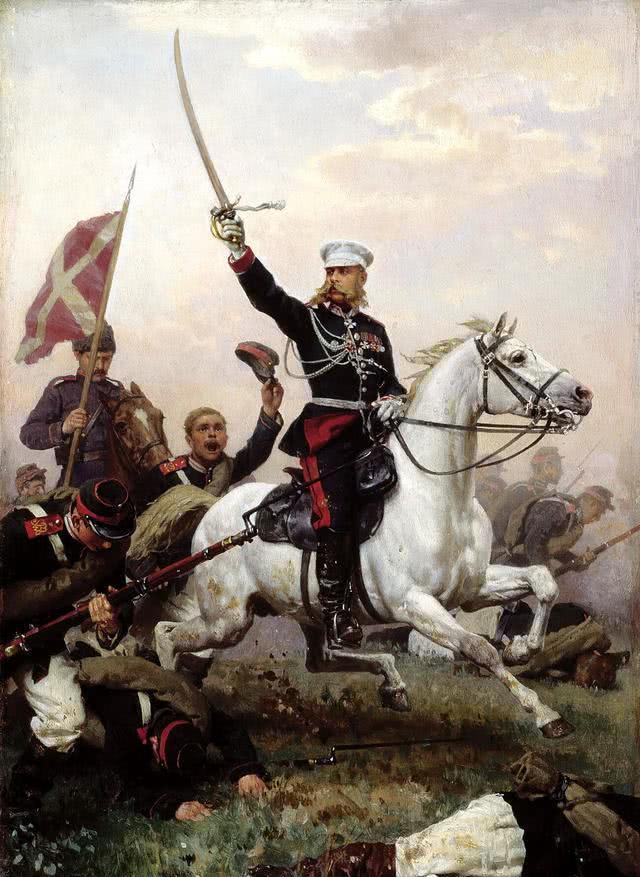In November 1880, the Russian general Skobelev led an expedition to Turkmenistan in Central Asia, an expeditionary force of Russian infantry and Cossack cavalry, numbering about eleven thousand men and armed with 97 cannons. Prior to this, the Russian army had already invaded the Turkmen's gathering places, but these firearm-armed Russian troops were beaten by the nomadic Turkmen and fled, which occurred in 1879.

Skobelev
These nomadic Turkmen in the deserts and steppes were more difficult to accept Russian rule than the natives living in the oases of Central Asia, and the Turkmen colony near the Caspian Sea was the last place in Central Asia to be conquered by the Russians. After the Russians occupied the river regions of Central Asia, the Turkmen began to attack the Russian caravans and soldiers, and they suddenly appeared in front of the Russians like ghosts, and quickly left after burning and looting, which caused headaches for the Russians.
When the Russians conquered the cities of Central Asia, they often bribed the local nobles and city lords by coercion and inducement, and when the nobles in the city surrendered to the Russians, the inhabitants would also move closer to the Russians and become the "loyal" subjects of the Tsar.
But this method could not be implemented among the Turkmen, because as soon as the Russians bought or killed a Turkmen chief, their people would immediately elect another chief who opposed the Russians in order to continue their rebellion against the Russians.
Turkmen under Tsar rule
In February 1880, Tsar Alexander II convened a royal council to decide on the complete conquest of the Turkmen in Central Asia, a task that was entrusted to Skobelev, who, with Alexander II's order that "no one step back", led the Russian army to Turkmenistan. At that time, the Turkmen built a castle on the Ahar oasis, which was rich in sweat and blood, called Geoktepe Fort, which housed about 20,000 Turkmen warriors, who still used cold weapons and caused the Russian army a lot of suffering.
On January 4, 1881, Skobelev's Russian army arrived at Göktepeburg, and Skobelev, who was very experienced in combat, decided to besiege the fort, and he built many trenches along Gökdepeburg in the hope of luring the Turkmen in the fortress to take the initiative. After more than a week of siege of Gyotepeburg, the Turkmen warriors in the fortress attacked, charging the Russian positions on horseback.
Battle of Geokteppeburg
Beginning with the Mongol Conquest in the thirteenth century, for a long time the Russians had been ravaged by nomadic Mongols and Tatars, but this time they were not afraid to face the nomadic Turkmen, because in the face of modern firearms, the Turkmen cavalry, who were good at riding and shooting, appeared vulnerable. After several death-like assaults, the Turkmen warriors paid a heavy casualty price, and they fled back to the fortress, hoping to rely on the tall walls to resist the Russians.
But Skobelev did not give them a chance, and as soon as the Turkmen warriors had returned to the castle, Skobelev began to order his soldiers to destroy the walls with explosives, and when the walls were destroyed by the explosives, the Russians rushed into Theodepe Fort, and a massacre began.
After killing more than 6,000 Turkmen defenders in the city, Skobelev ordered his men to point their guns at the civilians in the fortress, and about 8,000 Turkmen civilians were killed by the Russians, who suffered only more than a thousand casualties.
turkmen
At the end of this brutal battle, the Russians completed the occupation of all of Turkmenistan, and from that moment on, all the lands of Central Asia were incorporated into the Russian Empire, and the Turkmen were ruled by the Russians for more than a century. In the Battle of Skobelev, about thirty thousand Turkmen warriors and civilians died at the gunpoint of the Russians, which was a heavy blow to the already small number of Turkmens.
Thus, for a long time after the Battle of Gökteppeborg, the local Turkmen wept bitterly whenever they heard the Military Song of the Russians, because almost every family lost their lives in that battle.
The massacre of Turkmen civilians by Skopelev has also made many European scholars scold him, many scholars believe that Skobelev is a cruel jackal, and even some scholars in Russia have criticized Skobelev's massacre of civilians.
It is said that before Skobelev's death, he still had no regrets about his massacre of Turkmen, and only one year after the end of the Battle of Geoktepeburg, Sbekerev died of illness at the age of thirty-nine. Before Skobelev's death, an Orthodox priest asked him if he would regret the massacre of eight thousand Turkmen civilians, and Skobelev replied only:
"I regret not killing eighty thousand people."
After the independence of Turkmenistan, in order to commemorate the Turkmen who died in the Battle of Geoktepeburg against the invasion of the Russian army, they will commemorate January 12 (the day the Russian army captured Gektepeburg) every year. Whenever this day comes,
Turkmen would go to the cemetery near Gökteppeburg to present flowers to those who had died in the fight against the invaders.